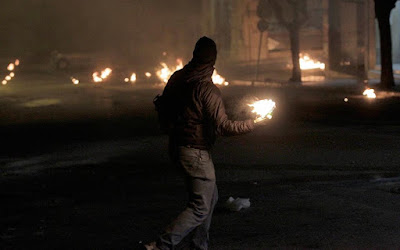 |
| Kathimerini photo of the December 6th, 2015 riots in Athens |
Alexis Grigoropoulos was shot and killed in
cold blood by a member of the Athens police force on December 6th 2008.
The defendant and other members of the police initially attempted to cover up
the unwarranted killing, but evidence and a lengthy investigation into the case
proved otherwise. The
Press Project has published a detailed assessment of the case in English.
Unfortunately, since that date, each
anniversary of the Grigoropoulos killing has become an event in which gangs of
young men roam Exarheia and downtown Athens, burning and destroying at will,
until they are stopped by the legions of police mobilised to prevent any more
serious incidents.
Unfortunately, legitimate peaceful marches
to commemorate the killing are used by these “protesters” to gain cover. In the
most recent events in Athens, thirteen people were arrested (as
reported by Kathimerini).
The November 17th commemorations
of the deaths of students at the Athens Polytechnic are another event that has
sadly been commandeered by “anarchists”, who use the occasion of the march to
the US Embassy to engage in the same pointless street battles with the police.
In both cases, the symbolism of the
violence from the viewpoint of the perpetrators is obvious: they claim to be
striking back against the front-line troops (the police) of an oppressive
order. Yet in both cases, there is every reason to believe that this is a
totally pointless ritual, devoid of any real meaning besides the internal
requirements of the “resistors” and, on the opposing side, of “law and order”.
If the “anarchists” are really concerned
with social justice, then they should be equally concerned with the large-scale
property damage they inflict on blameless bystanders. Moreover, if they really
want to bring about lasting political change, then it is obvious that
short-term “insurrection” on predictable dates (December 6, November 17), is
hardly the way to do this.
These same protesters and anarchists, after
all, have in the past entered politics, and become part of the ruling class,
defended by the same forces of law and order that they used to spend time
attacking.
These same anarchists have no alternative
plan for real anarchy. By day, they study at university or work in the real
economy. By night they riot, but only on specific occasions. Where’s the
revolution?
There have been other countries in the
European Union that have suffered far more under oppressive regimes in the
recent history. Poland, Lithuania, and others have seen a far higher body count
due to Nazi invasion and the subsequent Soviet occupation.
Most families in Lithuania, for instance, have
seen a relative deported and disappeared in the Soviet Gulags. Yet in none of
these countries do equivalent rituals unfold, where the useless and deliberate
destruction of public and private property in the hollow name of “rebellion” or
“resistance” has become an anticipated annual event.
There is something seriously wrong with a
society that not only tolerates useless rituals, but ritualises them without
question. Particularly in the absence of any logic or coherence as regards
actual conditions in the real world.
© Philip Ammerman, 2015

No comments:
Post a Comment